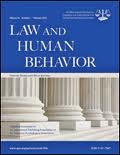Children gave more complete and consistent reports of adult wrongdoing in response to open-ended questions when interviewers used a supportive (vs. neutral) interviewing style across two interviews. The identity of the interviewer (same or different) had little impact on their accounts. This is the bottom line of a recently published article in Law and Human Behavior. Below is a summary of the research and findings as well as a translation of this research into practice.

Featured Article | Law and Human Behavior | 2019, Vol. 43, No. 6, 507-516
Effects of Interviewer Familiarity and Supportiveness on Children’s Recall Across Repeated Interviews
Author
Sonja P. Brubacher, Griffith University
Debra A. Poole, Central Michigan University
Jason J. Dickinson, Montclair State University
David La Rooy, University of London
Zsófia A. Szojka, University of London
Martine B. Powell, Griffith University
Abstract
Objectives: Child witnesses often describe their experiences across multiple interviews. It is unknown whether talking with a familiar interviewer increases disclosures, however, or whether any benefits of a familiar interviewer could be achieved by ensuring that interviewers (regardless of familiarity) behave in socially supportive ways. This study tested the effects of interviewer familiarity and social support on children’s reports of an adult’s transgressions. Hypotheses: We predicted that familiarity and supportiveness would increase transgression reports at a second interview and that children who spoke with familiar, supportive interviewers would disclose the most transgressions. Method: Children (N = 160, 5 to 9 years) participated in a science event involving 6 transgressions. Across 2 interviews, they spoke with the same trained university student interviewer or different interviewers, and these interviewers engaged in supportive or neutral behaviors. Interviews were coded for overall information reported, number of transgressions, and confabulations. Results: There were no effects of support in the first interview or on total details reported in either interview. Children reported more transgressions to supportive than neutral interviewers in the second interview (IRR = 1.19), even during open-ended prompting (IRR = 1.26), and they omitted fewer transgressions that had been reported in the first interview (IRR = 0.69). Confabulations were infrequent. There were no condition differences in the total number of confabulations reported across interviews, but these errors occurred more often in the second interview in the supportive condition. Conclusions: Interviewer support may play a greater role than familiarity in facilitating children’s testimony.
Keywords
repeated interviewing, interviewer support, interviewer familiarity, children, free recall
Summary of the Research
“Children who are alleged victims or witnesses of crimes often participate in multiple interviews about the matters under investigation. Concerns about repeated interviews have focused on the emotional toll on children, the potential for misleading influences to contaminate their testimonies between interviews, and the negative and cumulative effects of poor questioning on the reliability of their accounts. As the quality of investigative interviews gradually improved, however, researchers and practitioners began to recognize the benefits of repeated interviews when professionals follow best-practice guidelines. Today, training programs that include instruction on conducting repeated inter- views recommend many of the best practices originally developed for single-session interviews, including interview recording, favoring open-ended prompts, and avoiding suggestive and leading questions” (p. 508).
“Despite mounting evidence that repeated interviews can benefit children’s testimony, there is insufficient research to guide practice. The current study addressed a frequently posed question from professionals who interview children: Should agencies and advocacy centers use the same interviewer or a different interviewer across sessions? On the one hand, the same interviewer provides additional opportunities to strengthen children’s trust by building greater rapport. If developing a relationship with a particular interviewer is key to increasing truthful disclosures, then consistent interviewers should be beneficial. On the other hand, children might report more information over time due to or because personal stories become easier to share. If this is the case, then the identity of the second interviewer could be irrelevant. Still another possibility is that the level of interviewer support enhances or attenuates any potential benefits of interviewer familiarity. It is possible, for example, that the emotional benefits from a familiar interviewer are greater when interviewers act supportively; alternatively, it may not matter who does the questioning as long as interviewers display supportive behaviors” (p. 508).
“To advance practice guidelines for multiple interviews, we manipulated the familiarity of the interviewer and the level of interviewer support across two interviews with extended free recall phases. The effects of familiarity and support on disclosure reports individually are unclear, and studies have not explored the joint influence of these interview characteristics. In order to assess children’s reports of adult wrongdoing, the to-be-remembered event contained six transgressions that formed a rich, cohesive sequence in which each transmission relied on commission of the previous one. The purpose of this design was twofold: (a) we wanted to increase the potential variability in how much wrong- doing children could report, and (b) we aimed to mimic, on a small and ethical scale, the situation in which an offender grooms a child for a more serious transgression by progressively increasing the severity of wrongdoing” (p. 509).
“Contrary to our prediction, familiar interviewers did not elicit more reports of transgressions in Interview 2 than unfamiliar interviewers did. Also, familiar interviewers elicited fewer new reports, perhaps because their presence cued the previous conversation. Supportive behaviors, however, encouraged transgression reports among children interviewed a second time. Notably, there was a facilitative effect of interviewer support even before inter- viewers asked focused questions, suggesting that support may reduce the need for specific questions to elicit additional disclosures from children. We also found that supportive interviewing encouraged consistency: Compared to children interviewed neutrally, children questioned by a supportive interviewer were less likely to omit a previously reported transgression from their second interview. This outcome is relevant to professionals who prepare children to repeat their accounts in court and suggests that the effects of questioner support beyond the forensic interview must be considered in research and practice. For example, a lack of support may be one of several contributors to the inconsistencies that arise during cross-examination with children” (p. 513).
“The benefit of interviewer support did come at a cost: In the second interview, supportive interviewers elicited more confabulations than did neutral interviewers (but across both interviews, there were no differences). These confabulations were primarily intrusions of typical activities and elaborations on the germ theme, rather than fantastic details, and none were concerning. We speculate that comfort and sociability increased for some children when a friendly person interviewed them for the second time. This is consistent with the finding that 3- to 7-year olds who were temperamentally more sociable produced higher levels of inaccurate details when interviewed by forensic inter- viewers about a magic show, compared to less sociable peers. Alternatively, this could be an unstable finding because there was not a significant effect of supportiveness on the number of confabulations elicited across interviews. Future research is needed to assess the stability of—and underlying contributors to—elevated confabulation rates in Interview 2. Furthermore, this effect should be studied under conditions where children who have not experienced transgressions are questioned by interviewers who believe they have” (p. 514).
“In sum, results from this study add to existing findings that supportive interviewing can facilitate children’s reports, especially when combined with a second opportunity for retrieval under optimal interviewing conditions. Although more research is needed, these findings are good news for agencies that wish (or need) to conduct repeated interviews. Our results suggest that the identity of the interviewer is less critical than is high-quality interviewer training, including practice in using social support. These findings, however, may not extend to situations where victims need multiple exposures to an interviewer before feeling comfortable enough to disclose. Ultimately, case features and investigative needs should drive decisions about who conducts a child’s subsequent interview” (p. 515).
Translating Research into Practice
“It is unclear what phenomenon drove the increase in transgression reports when children experienced supportive versus neutral interviewing in Interview 2. This advantage could be due to more extensive memory searching, which fosters retrieval of previously reported as well as new event components. Social support is believed to make children feel more comfortable, which, in turn, allows them to engage in more careful memory retrieval. If supportive interviewing at the second interview solely affected reminiscence, however, one would expect to observe an overall increase in new target event details instead of a concentrated effect on transgression reports. Alternatively, it could be due to a reduction in motivational barriers to disclosing (i.e., reluctance) when children had the opportunity to share their experience a second time. Much of the supportiveness literature suggests that noncontingent sup- port should decrease barriers to reporting of sensitive information. Finally, it is plausible that both mechanisms operate together” (p. 513-514).
“There are several possibilities as to why an effect of inter- viewer support was absent in Interview 1. A recent systematic review and meta-analysis of 13 experimental studies and 2 exceptional quasi-experimental field studies also concluded that there are generally few effects of interviewer support in free recall phases. There was some evidence, however, that supportiveness effects would be stronger with particularly anxious children; when contrasted against explicitly unsupportive behaviors like disapproval, frustration, and contradiction; and at longer delays than typically employed in analog studies. By using neutral rather than nonsupportive interviewers in the current study, and avoiding specific and suggestive questions, we therefore stacked the deck against finding any effects of supportiveness. But this design was purposeful: We argue that our manipulation increased ecological validity because few interviewers today are overtly unsupportive. This design decision likely made it difficult to detect any effects of supportiveness only days after the event, when memory traces were strong and children in both conditions averaged several transgression reports. Because support is believed to encourage more effective memory searches, perhaps its effects are evident only when memory has weakened somewhat” (p. 514).
Other Interesting Tidbits for Researchers and Clinicians
“There is a difference between repeated interviews and extended interviews. In the present study, children were reinterviewed about the same topic because we were interested in studying reminiscence, and there are numerous situations where children will give the same account repeatedly (such as when they first disclose to a social worker and then converse with the police or give testimony in court). In contrast to repeated interviews, extended interviews stretch a forensic interview across multiple sessions. Topics may be revisited if the information obtained was sparse or confusing, but the goal is generally to progress through the allegation or allegations rather than revisit the same information. Extended interviews are sometimes planned when interviewers have reason to suspect that victims will be highly reluctant. In these cases, the effects of interviewer familiarity might be significant, and this is an important question for future work. Indeed, Ahern and colleagues (2017) found that practitioners who inter- view child exploitation victims said they had to meet with victims many times (sometimes over a period of years) to establish trust because the victims had such a deep-rooted mistrust of authority figures. Investigation details were not discussed at these early sessions, however” (p. 515).
Join the Discussion
As always, please join the discussion below if you have thoughts or comments to add!






